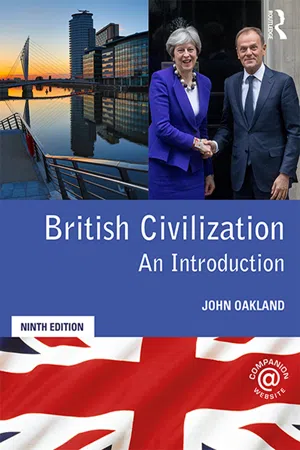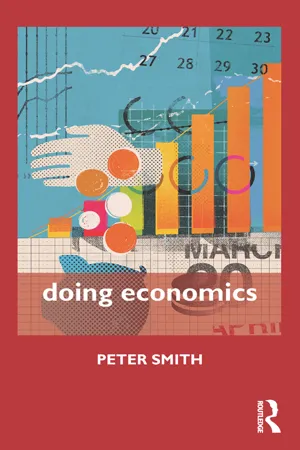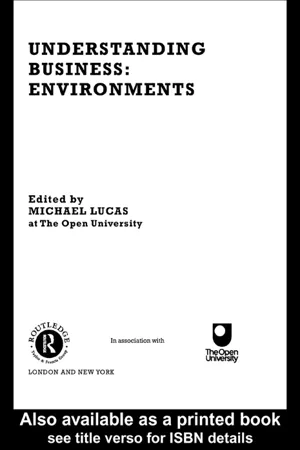Economics
United Kingdom Economy
The United Kingdom economy is a mixed economy with a strong focus on the service sector, particularly finance, and is one of the largest in the world. It has a diverse range of industries including manufacturing, technology, and creative industries. The UK economy is influenced by global trade, government policies, and the performance of the European Union.
Written by Perlego with AI-assistance
Related key terms
Related key terms
1 of 4
Related key terms
1 of 3
3 Key excerpts on "United Kingdom Economy"
- eBook - ePub
British Civilization
An Introduction
- John Oakland(Author)
- 2019(Publication Date)
- Routledge(Publisher)
8The economy- Early British economic history
- The modern economy: policies, structure and performance
- Social class, the workforce and employment
- Financial institutions
- Industrial and commercial institutions
- Consumer protection
- Attitudes to the economy
- Exercises
- Further reading
- Websites
The economy is an important element in British national life. This chapter examines economic policies; the diversity and performance of economic production; the influence of class on the economy; and the different economic institutions.Fluctuations in national and global economies directly affect British people in their daily lives. Such changes influence inflation and interest rates, employment and unemployment, individual and corporate income, wealth creation, taxation, investment, government economic plans, social welfare and political party activity.Historically, the British economy has been conditioned by agricultural and industrial revolutions; a dramatic growth and later reduction of traditional manufacturing in the eighteenth, nineteenth and twentieth centuries; the emergence of alternative government policies and intervention in the economy; the modern expansion of service industries; and a relative global decline in British economic performance and international status from the late nineteenth century as competing nations industrialized. The economy experienced periods of expansion and recession (‘boom and bust’) in the twentieth century, with strong growth, low inflation and high employment alternating with increases in unemployment, inflation and interest rates leading to weak growth and low economic productivity.The economy continued to suffer cyclical difficulties in the early twenty- first century. The worst effects of a worldwide recession were avoided in the early 2000s, but from 2005 Britain entered a slowdown. This coincided with increased global oil prices, high public spending and a fragile consumer market which was affected by higher interest rates and rising inflation. It then faced a severe world credit crisis and recession (defined as two successive quarters of a year when the economy shrinks) between 2007 and 2010. But fears that financial systems were in danger of collapse were eased by new corrective economic tools, such as ‘quantitative easing’ (purchase of assets by central bank to stimulate the economy). Britain came slowly out of recession in early 2010, but its recovery was hampered by a £178 billion budget deficit, amounting to 11 per cent of Gross Domestic Product (GDP). Governments imposed austerity programmes with severe spending cuts and tax increases in an attempt to reduce the deficit, but recovery was slow. - eBook - ePub
- Peter Smith(Author)
- 2016(Publication Date)
- Routledge(Publisher)
Notice that many of these definitions focus more on the processes that economists study, rather than setting out the scope, or the subject matter, of the discipline. Many popular books written by economists in recent years (e.g. Levitt and Dubner and Harford) have expanded horizons by showing how economic thinking can be used to answer any number of questions about aspects of life not normally associated with economics. These offer an entertaining introduction to how economists may think – but do not necessarily provide a foretaste of what it will be like to study the subject at university. Indeed, the Korean economist Ha-Joon Chang of the University of Cambridge has noted that there are many economists who tend to ‘define their subject in terms of its theoretical approach, rather than its subject matter’ (Chang, 2014).Introductory textbooks have also tended to shy away from providing a simple definition of the subject. Indeed, many of them also focus on the ‘central economic problem’ – the problem of coordinating production decisions with consumption. We will explore this more carefully soon.If you study economics at a UK university, you will find that the programme of study is designed to meet the subject benchmark that is set by the Quality Assurance Agency (QAA), which is the regulator for universities in the UK. In July 2015, the QAA published its latest national subject benchmark for economics, setting out what every undergraduate economics programme in the country is expected to deliver. It therefore makes sense to begin with their statement of what economics is:Economics is the study of the factors that influence income, wealth and well-being. From this it seeks to inform the design and implementation of economic policy. Its aim is to analyse and understand the allocation, distribution and utilisation of resources and the consequences for economic and social well-being. Economics is concerned with such phenomena in the past and present and how they may evolve in the future.http://www.qaa.ac.uk/en/Publications/Documents/SBS-Economics-15.pdf , p. 5This statement sets out what you can expect from a university education in economics. It was produced by a review group composed of academic economists from a range of UK universities together with employer and student representatives. All economics programmes in the UK are required to fulfil the expectations set out in the benchmark statement – which goes on to provide much more detail about the content of programmes and the skills and attributes of an economics graduate. As this book progresses, it will touch base with this document from time to time to explain how it will influence the education that you will receive. - eBook - ePub
- Michael Lucas(Author)
- 2005(Publication Date)
- Routledge(Publisher)
Section 1: The Economy Introduction The economy is arguably the dominant environment in terms of its influence on business behaviour. Businesses, particularly those in the private, profit-orientated sector, often pay more attention to the current state of the ‘economy’ and the direction of governments’ economic policies, than to any other external events. The fairly obvious reason for this is the strong influence changes in these factors can have on their financial resources. Predicting the impact of such changes has taxed economists for many decades and continues to do so. Academic economists work on producing complex and often mathematically-based models of the relationships between government policy, economic performance and business responses, particularly in the financial sector. Professional economists interpret and adapt these to generate future forecasts. In chapter 4, Wilks, while not offering a typical example of the work of ‘pure’ academic economists, which would be much more mathematical, does give us a flavour of their concerns in his appraisal of government policy between 1979 and 1997. Most crucially it focuses on one major tenet of policy which he regards as having contributed to the UK’s relative success in economic performance during that period – the deregulation of corporate decision-making. This has been a dominant theme – some would say the underlying orthodoxy – of much of the work of academic economists during the last three decades or more. Will Hutton in his roles as a leading economic journalist for the Guardian/Observer and popular writer, has been one of the most prominent critics of this orthodoxy. In chapter 5, his appraisal of the effects of deregulation of the financial sector, one of the major ‘policy successes’ of the period, is much more stark and pessimistic
Index pages curate the most relevant extracts from our library of academic textbooks. They’ve been created using an in-house natural language model (NLM), each adding context and meaning to key research topics.
Explore more topic indexes
Explore more topic indexes
1 of 6
Explore more topic indexes
1 of 4


